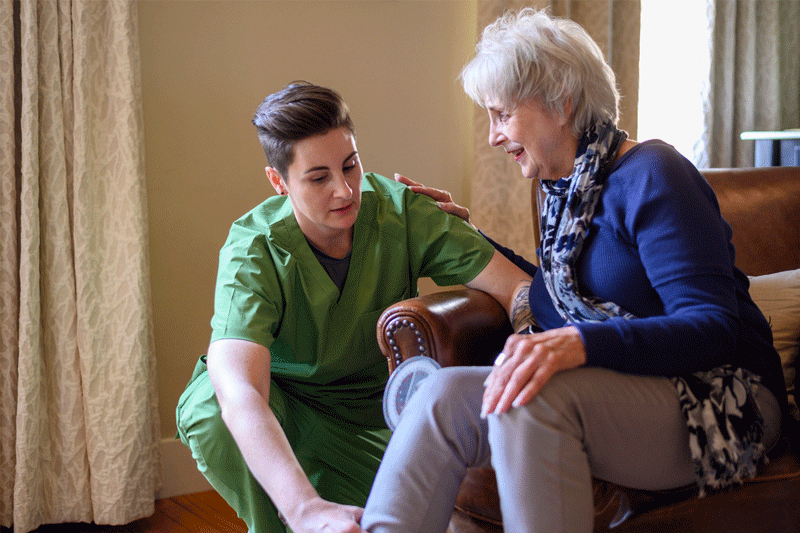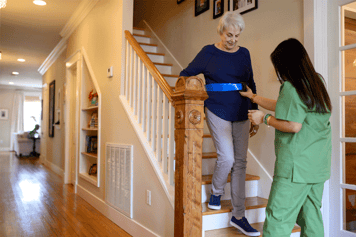When you go home to visit your aging parents, you may notice Mom or Dad has changed since the last time you saw them. By looking out for early signs of declining health, you can put together a plan to help them stay independent as long as possible. Here are a few of the signs your elderly parents may need home health care:
1. They were recently diagnosed with a serious illness.
Elderly adults who have been diagnosed with a serious illness may need education and skilled care, such as a licensed nurse, speech therapist, occupational therapist or physical therapist, to manage their symptoms and stay out of the hospital. Some of the conditions that are often managed with home health care include:
- Heart failure and other heart conditions
- Stroke
- Diabetes
- COPD and other respiratory conditions
- Alzheimer’s disease and other forms of dementia
- Parkinson’s disease, rheumatoid arthritis and other progressive neurological conditions
- Cancer
Older adults who need help recovering from surgery, were recently hospitalized or had a change in health status may also be eligible for home health care. Medicare covers 100% of the cost for eligible patients.
2. They’re trying to manage multiple chronic health conditions.
Four in ten Americans aged 65 and over has multiple chronic health conditions. This increases their risk of going to the hospital and struggling with daily activities. “When a person has multiple disease processes happening at once, they will need to add specific tasks to their day – things like weighing themselves or monitoring blood glucose levels. They’re likely taking several medications,” says Carolyn Thornsberry, MS, OTR/L, COS-C, an occupational therapist and home health clinical education specialist at Amedisys. “It’s a lot to ask an older adult to manage without help.”
3. They frequently visit their doctor or the hospital.
Heart failure, pneumonia, COPD and stroke are among the top reasons older adults get admitted to the hospital. In addition to being costly and inconvenient, repeated hospitalizations can impact your aging parents’ health and lower their quality of life. “As an elderly adult’s health declines, their mobility and self-care suffer as well,” Thornsberry explains. “If they need more help from their doctor, they likely need more help at home too.”
[action 1]
4. They need help to get out of the house.
Do your aging parents spend most of their time at home, only leaving for necessities like medical appointments, a special family event or religious services? If your aging parents leave home infrequently and only for a short time because it requires a great deal of effort, home health care may help. A telltale sign is that they need a walker, wheelchair, crutches or another person’s help to leave home.
5. They recently had a fall.
Aging often brings changes in balance, strength and ability to move around with ease. You may see your aging parents holding onto furniture while walking through the house or looking unstable when standing up from a seated position. Or you may know they recently had a fall. Even if they didn’t get hurt, falls can be a sign that your aging parents need help. Understandably, many older adults respond to a fall by moving less. But moving less can make it even harder to do daily activities and increases the risk of falls.
6. They’ve changed their routine.
Someone who typically showers and changes clothes daily may start looking disheveled or change their clothes every few days. Or perhaps they used to be organized but now the house needs a good cleaning or there are piles of unopened mail around the house. These can be signs your aging parents don’t feel they can do daily activities safely anymore.
“We often see older adults’ lives shrinking,” says Thornsberry. “They only live in certain rooms of the home or they gather all their necessities around a recliner or bed so they don’t have to move. They avoid activity because the risks seem to outweigh the benefits, but avoidance makes the problem worse.”
7. They’ve lost interest in activities they used to enjoy.
Your aging parents may stop traveling, going to family gatherings or doing things they used to enjoy. This could be because they’re afraid of falling or because it’s overwhelming to try to follow conversations. While isolation is an understandable response, it can increase the risk for dementia, depression, infection, high blood pressure and other health issues on a level similar to smoking cigarettes and obesity.
8. They regularly forget to take their medications or take the wrong medication.
If you look at your parents’ pill bottles, are there too many pills left, or not enough? Are their medications organized or spread all over the house? Research shows 25% of older adults take at least five medications to treat chronic conditions. About 50% do not take their medications properly. While medication mistakes are common, skipping doses or taking too much medication can lead to serious health complications.
9. They’re having trouble eating or swallowing.
Do your aging parents cough or choke during or after meals or while taking medication? Do they make gurgling sounds like they need to clear their throat, or have a constant runny nose? Swallowing problems can cause your aging parents to stop taking their medications properly or avoid eating and drinking, which could result in dehydration or poor nutrition.
10. They’ve lost or gained a noticeable amount of weight.
Check your aging parents’ pantry or refrigerator. Is it empty? Are there healthy, balanced foods available that are appropriate considering any medical conditions your parents have? Weight changes can be a sign of several health problems. They may also indicate that your aging parents are struggling with daily tasks like grocery shopping, cooking or eating. For example, older adults with dementia may forget to eat meals or how to prepare a meal. Those with Parkinson’s or other mobility issues may find food preparation painful and need help at home to manage those tasks.
How Home Health Care Helps
“Many older adults are hesitant to ask for help because they don’t want to end up in long-term care,” says Thornsberry. “Home health care might be an option that can help them stay independent longer in the comfort of their own home.”
Home health care may help older adults avoid unnecessary hospitalizations and reduce their risk of falling. Services may include:
- Education, tools and support so your aging parents can manage their condition at home
- A home health aide to help with daily activities such as bathing and getting dressed
- Speech therapy, which can help with breathing, swallowing, speaking, thinking skills and communication
- Physical therapy to improve strength, balance and movement
- Occupational therapy to address home safety and adapt your aging parents’ home environment to improve safety with self-care
- A home health nurse to coordinate the plan of care, assess your parent’s condition and provide wound care and other services
- Community resources and long-term care planning with a medical social worker
- Medication management
- Support and relief for caregivers
How You Can Help Your Elderly Parents
Learn about home health care. Read as much as you can about the benefits of home health care so you can help educate your aging parents. We can help determine whether elderly adults might be eligible for home health care.
Stay in touch. One way to stay in tune with your aging parents’ needs is to have regular check-ins. In a caring and compassionate way, ask if they’ve been to the doctor lately and to see medications, paperwork and instructions from their doctor. The goal is to understand if your aging parents need more help to manage their health and prolong their life.
Go to a doctor’s appointment with your aging parents. Ask questions about the signs you’re seeing. It’ll help you understand your parents’ needs and options for care. It’ll also give their doctor new insights and an opportunity to follow up at future appointments. To be covered by Medicare, Medicaid or insurance, a doctor must decide your parents meet the eligibility requirements and order home health care.
Research your options. If your elderly parents are eligible for home health care, you may have several options available to you. One way to assess the quality of a home health agency is through Home Health Compare, which provides information about Medicare-certified home health companies, patient experiences and quality scores.
CONTACT YOUR LOCAL CARE CENTER TODAY
Most aging parents don’t recognize the signs that they need help. Even if they do, they may be afraid to ask for help, thinking it could jeopardize their independence or burden a family member. You play an important role in recognizing their need for help and advocating for care that keeps them safe and improves their life.






